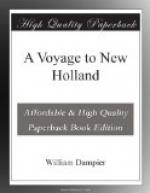The governor who resides here is called Don John de Lancastrio, being descended, as they say, from our English Lancaster family; and he has a respect for our nation on that account, calling them his countrymen. I waited on him several times, and always found him very courteous and civil. Here are about 400 soldiers in garrison. They commonly draw up and exercise in a large parade before the governor’s house; and many of them attend him when he goes abroad. The soldiers are decently clad in brown linen, which in these hot countries is far better than woollen; but I never saw any clad in linen but only these. Beside the soldiers in pay, he can soon have some thousands of men up in arms on occasion. The magazine is on the skirts of the town, on a small rising between the nunnery and the soldiers’ church. It is big enough to hold 2 or 3000 barrels of powder; but I was told it seldom has more than 100, sometimes but 80. There are always a band of soldiers to guard it, and sentinels looking out both day and night.
A great many merchants always reside at Bahia; for it is a place of great trade: I found here above 30 great ships from Europe, with 2 of the King of Portugal’s ships of war for their convoy; beside 2 ships that traded to Africa only, either to Angola, Gambia, or other places on the coast of Guinea; and abundance of small craft that only run to and fro on this coast, carrying commodities from one part of Brazil to another.
The merchants that live here are said to be rich, and to have many negro slaves in their houses, both of men and women. Themselves are chiefly Portuguese, foreigners having but little commerce with them; yet here was one Mr. Cock, an English merchant, a very civil gentleman and of good repute. He had a patent to be our English consul, but did not care to take upon him any public character because English ships seldom come hither, here having been none in 11 or 12 years before this time. Here was also a Dane, and a French merchant or two; but all have their effects transported to and from Europe in Portuguese ships, none of any other nation being admitted to trade hither. There is a custom-house by the seaside, where all goods imported or exported are entered. And to prevent abuses there are 5 or 6 boats that take their turns to row about the harbour, searching any boats they suspect to be running of goods.
The chief commodities that the European ships bring hither are linen cloths, both coarse and fine; some woollens, also as bays, serges, perpetuanas, etc. Hats, stockings, both of silk and thread, biscuit-bread, wheat flour, wine (chiefly port) oil olive, butter, cheese, etc. and salt-beef and pork would there also be good commodities. They bring hither also iron, and all sorts of iron tools; pewter vessels of all sorts, as dishes, plates, spoons, etc. looking-glasses, beads, and other toys; and the ships that touch at St. Jago bring thence, as I said, cotton cloth, which is afterwards sent to Angola.




